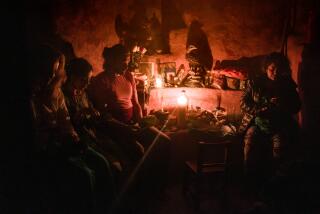A Dust-Up Over Mail-Order ‘Miracle Mud’ : Faith: A company markets bits of dirt as coming from a New Mexico shrine, touting supposed curative powers. The church says ads falsely imply that it sanctions the sale.
- Share via
The spiritual mud-wrestling battle is on.
In one corner is the veteran--a tiny 18th-Century Catholic church in Chimayo, N.M. Hundreds of thousands of people flock there annually to touch, rub on and even eat supposedly curative mud found in a room just off the sanctuary, leaving about $100,000 a year in donations.
In the other corner is the upstart--a Canoga Park direct-mail company selling a product called “The Miracle Cross of Chimayo” ($16.95, plus postage), embedded with a bit of Chimayo dirt. Ads for the cross in mail solicitations and supermarket tabloids promise that “you will be blessed with love, luck and financial security.”
Officials at the church, which is lined with crutches, canes and wheelchairs of those who say they were able to cast them off after visiting the sanctuary’s dirt pit, have cried foul.
“It is like saying to someone, ‘You give me $2 and I will give you this dirt touched by God to cure you,’ ” said Father Miguel Mateo, who oversees the operation of the Santuario de Chimayo, where the church mud resides. “It would be like selling God.”
Burton Usen, who created the Miracle Cross and heads the company that distributes it, said he did not intend to upset the church.
“We were very careful to separate ourselves from the church and its own mud,” Usen said, speaking from his home in Santa Monica.
But Mateo said Friday that he has received several letters and calls from people who thought the church was involved in the venture. Mateo believes that the ads imply that the Miracle Cross dirt came from the church.
“They are clever, never saying it in so many words,” said Mateo, who has been at the church for three years. “But come on, the ad gives the history of the church and the mud in Chimayo. It is misleading.”
Mateo said he sent a letter of complaint in July to Dassi Inc., the company that distributes the cross, but received no answer.
Dassi, housed in an unmarked Canoga Park office building, offers its direct mail customers about 60 religious, occult and New Age items ranging from good luck charms to subliminal tapes.
Usen said he created the Miracle Cross after a trip to New Mexico about a year ago.
“A woman I met on the plane told me I should go to Chimayo, that it was a very special place,” he said. In the advertisement, he describes a walk he took in a field near the small town just north of Santa Fe.
“Suddenly I stopped and sank to my knees,” he wrote in the ad he signed with the pen name Burton Charles. “I scooped up a handful of earth in my hands, and at that moment my life changed.”
Shortly thereafter, the tale continues, his financial problems turned around and romance came into his life. The brochure, in Southwestern colors, offers to make the same benefits available to mail-order buyers.
“But now you don’t have to travel to Chimayo to experience the benefits of its blessed earth,” the brochure reads.
The metal cross offered to readers is about 2 inches by 3 inches and has a plastic bubble embedded in its center that holds a small amount of dirt. Usen said he brought the dirt home from Chimayo in plastic bags.
“It was sort of funny explaining that to airport security,” he said.
Among other things, the brochure promises that “your money problems will fade as your savings grow” and includes a money-back guarantee if the cross doesn’t work.
The Postal Inspection Service, which investigates mail crimes, said it has no complaints on record against Dassi. The Canoga Park Chamber of Commerce said it has not had any problems with the company.
The Santuario de Chimayo church, which has, on a smaller scale, a reputation similar to that of the Lourdes shrine in France, can claim a far longer history than Dassi.
Since about 1800, the community of Chimayo, with a spectacular setting in the foothills of the Sangre de Cristo Mountains, has been known as the home of master weavers. Legend has it that in 1814 a black crucifix was found buried near a grove of cottonwoods. A church was built on the site in 1816 with a special room included to house the pit from which the cross was dug out. The pit is the source of the sacred mud.
Mateo said the church is visited by about 300,000 people every year, including as many as 40,000 during Easter weekend.
The priest said he does not believe that the mud has miraculous powers.
“The dirt becomes a symbol and expression of faith,” he said. “Everyone knows it is the faith of the person that is important. It is the power of God that heals.”
Nonetheless, Mateo said, he believes that God chooses special places to exhibit divine intervention. “We do not have an answer why this happens here and not in Los Angeles,” he said.
The priest said he witnessed one miracle cure himself. “I had to help a very old woman in a wheelchair into the church,” he said. “Later that day she came to me walking and crying and full of joy.
“Of course, I didn’t know anything really about her before she came to the church.”
Although he scorns any commercialization of the mud, Mateo is thankful for the contributions the public makes to the church.
“Just to clean the art in the sanctuary, we got an estimate of $26,000,” he said.
And the money will fund other projects. “With all these visitors,” he said, “we just have to build a parking lot.”
In the wake of press inquiries into the matter, Usen, who said he never received Mateo’s letter of complaint, contacted the priest Friday and said that the next shipment of mail solicitations for the Miracle Cross would include a disclaimer saying the offer was in no way connected with the church.
“It’s a little better that way,” Mateo said. “But I wish they would drop the mention of Chimayo altogether.”
More to Read
Sign up for Essential California
The most important California stories and recommendations in your inbox every morning.
You may occasionally receive promotional content from the Los Angeles Times.














